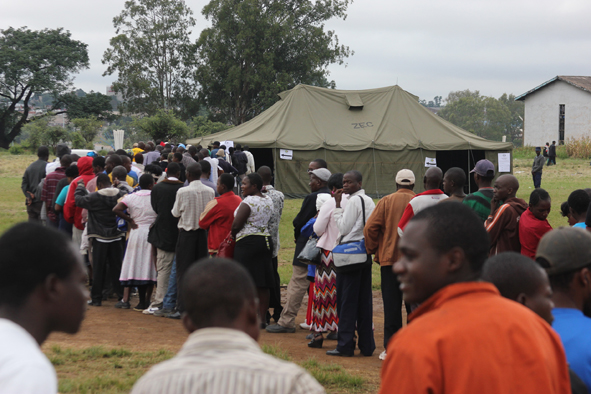
THE Constitutional Court yesterday ordered President Robert Mugabe to immediately proclaim the dates for harmonised general elections and ensure they are held no later than July 31 this year.
Report by Charles Laiton
The court also ruled that the failure by Mugabe to fix and proclaim the date or dates for harmonised general elections by June 29 this year was a violation of his constitutional duty towards the country’s citizens.
The court observed that Mugabe had violated his functions as a public officer in accordance with the law and to observe and uphold the rule of law in terms of section 18(1) of the Constitution.
“Accordingly the first respondent (Mugabe) be and is hereby ordered and directed to proclaim as soon as possible a date(s) for the holding of the Presidential election, general election and elections for the members of governing bodies of local authorities in terms of section 58(1) of the Constitution of Zimbabwe, which elections should take place by no later than July 31, 2013,” Chief Justice Godfrey Chidyausiku ruled.
“It is declared that the harmonised general elections in terms of section 58 (1) of the Constitution of Zimbabwe are due upon the dissolution of Parliament on June 29, 2013. However, due to the first respondent’s failure to issue a proclamation fixing the date for the harmonised elections timeously it is no longer legally possible to hold the harmonised elections on that date.”
The ruling follows an application by a citizen, Jealous Mawarire, demanding that Mugabe should urgently proclaim election dates, arguing further delays would disenfranchise the electorate.
The Constitutional Court bench comprised of Chief Justice Chidyausiku, his deputy Justice Luke Malaba, Justices Paddington Garwe, Bharat Patel, Ben Hlatshwayo, Vernanda Ziyambi, Antonia Guvava, George Chiweshe and Anne-Mary Gowora.
- Chamisa under fire over US$120K donation
- Mavhunga puts DeMbare into Chibuku quarterfinals
- Pension funds bet on Cabora Bassa oilfields
- Councils defy govt fire tender directive
Keep Reading
However, Justices Patel and Malaba were the only dissenting voices.
On the question of legal costs, Chief Justice Chidyausiku said: “Ordinarily, a respondent (Mugabe, Prime Minister Morgan Tsvangirai and his deputy Arthur Mutambara, MDC leader Welshman Ncube and Attorney-General Johannes Tomana) who takes this attitude will not be ordered to pay the costs. However, in this case it is the conduct of the first respondent (Mugabe) in failing to timeously fix the date for harmonised elections that has compelled the applicant (Mawarire) to approach the court.
“Apart from this, the first respondent represents the State, and in my view it is only fair and just that the State should pay the cost of a public-spirited citizen like the applicant, who undertook the responsibility of doing something about an electoral process that has gone astray.”
Tsvangirai and Ncube had opposed Mawarire’s application on the basis of an interpretation of section 58 (1) of the Constitution which the Supreme Court found to be permissible although erroneous.
The court also ordered Tsvangirai and Ncube to meet the cost of their court challenge.
“It is my hope that although the order of the court is not against the second and fourth respondents, they will use their good offices to assist the first respondent to restore the rule of law to the electoral process.”
Terrence Hussein represented Mugabe while Tsvangirai and Ncube were represented by Advocates Lewis Uriri and Tabani Mpofu. Mutambara and Tomana were unrepresented while Joseph Mandizha represented Mawarire.











